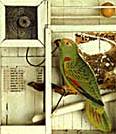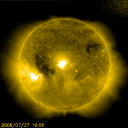"Animals," despite a conflation in the common mind with "mammals" ("we saw plenty of animals, birds and fish!") refers to any multicellular animals, from rotifers to right whales. The vast majority of animals, by sheer numbers, are microscopic. Of those that aren't, the vast majority are arthropods, which comprise three quarters of all known living and fossil species ... The majority of vertebrates are fish. The majority of terrestrial vertebrate species are birds, and 96 percent of the remainder are lizards and snakes. About half of all mammal species are rodents. Almost half the remainder are bats. Of mammal species not rodents or bats, almost half are ungulates. Of primate species, more than half are monkeys, with almost all of the rest lemurs or lorises ...
This is a planet of bats and rats, of sparrows, of beetles and ants, but mainly — to a first approximation — this is a planet of bacteria...
I find this point of view exhilarating, like looking at a starry sky and imagining the impossible distances. There is grandeur in this insignificance. There is an imperative not to take more than our share...
once we set ourselves apart from the rest of "creation," we begin to resent our ties to the earth. Of what importance is a snail, a rotifer, a tiger? We begin to imagine — and to implement — a world in which we are alone.
It is called hubris. It goeth before a fall, already in progress.
... We each of us are cooperative projects of a quadrillion or two prokaryotes, and those single cells conspire to create consciousness. It is as if pond scum, piled and shaped a certain way, began to discuss its purpose.
... We are the quintessence of dust and yet we are as gods in apprehension, and that's the whole point, and that's the whole problem.
Posted by Chris Clarke on 01/03 at 08:59 AM






No comments:
Post a Comment